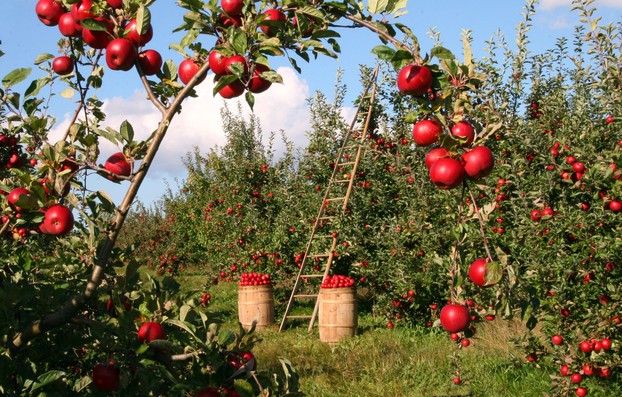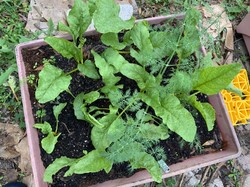It isi easy to condemn the young as idle ones who spend overmuch time mooching around, and in some cases there is truth in this accusation, but not always.However, young people naturally take to positive activities and love to be outdoors doing creative things. Moreover,they take an interest in wild life and can be great animal lovers. So children given a chance will take an interest in the wild life of a garden and will want to grow plants. But they need adults to communicate enthusiasm to them. And that is the adult's job.
Image courtesy of oom_endro

Getting Children into Gardening
by frankbeswick
Children need to learn the joys of gardening early in life so that they get into good habits.
A Child's Request
Having just had a session entertaining my grand-daughter aged nearly three, I, aged 68 and certainly less lively than she, settled into my armchair for a rest [much needed, I assure you] when she came up to me, took my hand and said "Water the plants, Grandad." There went my rest! But I acquiesced and went out with her to water the container garden in the back yard.
I had better explain.Maureen is moving from partial to full retirement in a few weeks time and has decided to use our back yard to plant a flower garden to enjoy in her retirement. The allotment is mine; the flower garden is hers. She insisted on doing the planting herself, under my guidance, and she has done a remarkably good job with a strategically placed number of potted plants around the shared space. But grand-daughter has taken to the flowery space and loves it. I first noticed her interest when I was watering the flowers for Maureen and the little girl said "I do it." Since then she has come round and expected to do the watering. It is quite simple, I hold the top handle of the watering can and she holds the rear one, as the can is too heavy for her. But she loves it to the extent of wanting to go and do it again, so I have had to tell her that there must be a limit to the watering. "No, we don't need to do it again." [Note that I have not mentioned her name, as her mother does not name her children on the internet for child security reasons.] She has picked up the art of plant care by watching her father tend his small, but beautifully kept garden and simply transferred the skill over to our house.
So what lessons can we learn from this? We learn that children pick up their enthusiasm from adults, for when an adult is interested the children want to join in. Children seek to model themselves upon adults and discover what being an adult involves by seeing what adults do in their own lives. But we can take this principle further for not only can we set an example of positive activities, but we can invite children into them. For example, when I was five we got our first garden, and my father took me to plant the flower bed in the front garden. I did remonstrate with my bemused parent by objecting that we should be growing potatoes rather than flowers. Even at five I had a mind set on vegetables to eat! Be enthusiastic and your children are likely to be swept along on the tide of your enthusiasm.
Adapt the task to the child. Weeding, for example,is best done under adult supervision, as children may weed out plants that you want. And be careful when using a hose. I overheard the following conversation between a grandmother and her infant grandson on the allotment today. She was teaching him to use the hose, and the conversation was, "No, don't point it at me. No!" She got wet.
Dangers
The first danger is to make gardening a burden. I can recall a case in which a neighbouring plot holder on the allotment used to bring her two sons, both pre-adolescent, and set them chores to do on the plot. As they grew older and more independent I noticed a growing reluctance to help. She is gone now, but the children stopped coming before she left, for when they reached teens they asserted themselves and rebelled. I have never forced my children to help on the allotment, though Andrew helps of his own volition and has continued this assistance into adulthood. The others came for a bit of fruit picking at times. In one case I offered one of my sons a deal. "You owe me a bit of cash, so you can pay back in cash or digging!" He chose digging and said afterwards it was the hardest work he had ever performed!There was no pressure though, for the choice was his.
Do not set tasks that are too hard or are frustrating. Work that is too heavy, onerous or tedious,like weeding, should be carefully apportioned so as to obviate the danger of boredom or disillusionment. Rather, children should from an early age experience success. I recently read a short internet biopic of Medwyn Williams, a Welshman who is arguably Britain's greatest living vegetable grower, with many gold medals to his credit, including eleven from the Chelsea Flower Show, Britain's top flower show. Medwyn started growing vegetables at the age of eight, when his father gave him a one metre square plot and guided him as he grew radishes,mustard and cress. From this square metre there came a lifelong process of development that has led through competition wins at Chelsea, Hampton Court, The Royal Welsh Show and Anglesey. Add this to a successful horticultural business producing seeds.This shows how one enthusiastic parent can plant the seed that will blossom into a wonderful bloom.
Gardening should be an inter-generational endeavour. Medwyn entered his earlier shows with his father, who is now dead and gone. But he has passed the business to his son and grandson. four generations of successful gardening that have sprung from an enthusiastic parent. With Andrew taking an interest and passing it on to his daughter I am hopeful that such a tradition is developing now.
Sometimes a successful ancestor establishes an ideal for descendants to follow. I know a man named Barry Eckford, who specializes in sweet peas, and I wondered why. Then during one road show promoting allotments he showed me the historical note that he had prepared on sweet peas, detailing how his great grandfather, Henry Eckford, had developed the sweet pea into a popular garden plant. There staring at me on the page was a picture of a massively bearded Victorian head gardener. The sweet pea had become a family tradition for my friend.
Children Love an Orchard
 Apple orchard Lumix2004 |
Touched by Magic
Children should be allowed to discover the enchantment of the garden. For a young child a garden is a magical place where they can encounter wild life, which should be encouraged. My grand-daughter has seen frogs, various birds and bees, by which she is really fascinated. This means being allowed to wander and dream in the garden, though where there perils, such as a pond, an adult should always be nearby. [Assess any dangers,such as nettles and thorny plants before you let a child loose in the garden]. Would The Secret Garden have been written if the author had not been allowed to dream as a young person? I doubt it. Letting children take some responsibility for feeding wild life is also beneficial, as doing so allows them to take a modicum of responsibility for animals, which children love.
If you are turning fruit products into jam, for example, get the children to take part, for doing so allows them to taste the fruit of their labours and gives them a stake in the garden. This will hopefully stimulate their interest.
There is no substitute for giving the children a proper system of values, a system that respects craft activities and regards them as integral to the life of every person. The craft of gardening should be celebrated and good gardening praised in front of the children. Too often in my country young people are raised without proper regard for crafts, and they dream of sitting behind a desk telling people who work with their hands what to do. So gardening is not seen as a high status job. It was a defective value system like this that gave rise to a comment by David Cameron, the prime minister whose spectacular misjudgement gave us the Brexit referendum that has led Britain towards economic problems. Cameron listed gardening among unskilled jobs. An unthinking misjudgement that belittled some well-skilled and hard working people! A serious injustice!
Crafts, moreover, should be seen not as something that you do when you have insufficient money to buy goods at the supermarket, but as an integral part of the fulfilled life; and gardening is a very enjoyable craft.
I have four adult children. One of them is a dedicated gardener. The others have taken more to it now that they have their own properties. This is another point, the parent plants to seed of an interest, but seeds vary in the time that they take a-growing. Some spring up quickly, but others are slower to mature. One thing is sure. The seed cannot be forced!
You might also like
Unleash Your Child's Green Thumb With Grow Box GardeningEasy to use grow boxes make neat and tidy kid's gardens. Children of all ages...
Gardening with KidsGardening with kids is both fun and educational. Having the right tools on h...






 TheThousand Year Gardenon 11/26/2025
TheThousand Year Gardenon 11/26/2025
 Women of the Gospelson 10/11/2025
Women of the Gospelson 10/11/2025
 Religious Gardenson 08/25/2025
Religious Gardenson 08/25/2025
 Doctor of the Church: John Henry Newmanon 08/03/2025
Doctor of the Church: John Henry Newmanon 08/03/2025



Comments
I am not aware of that kind of association, but I suppose that it occurs?
Thank you for your comment below, in answer to my previous observation and question.
Unitedstatesian businesses often appreciate the hallowed reputation associated with a former university site.
Does that association develop in the British Isles?
(Perhaps it makes them feel clever, intelligent and wise to muster as their physical address a site that once mattered to a clever, intelligent and wise -- ;-D -- university!)
Renting sites is common, and the rent is tax deductible, itcounts as a business expense?
Thank you for your comment below in answer to my previous observation and question.
A "thriving" business renting a University-owned site with University-owned greenhouses intrigues me.
Is it common for a "thriving" British-Isles business to rent instead of to own? Unitedstatesian businesses like such operating-expense deductions as monthly rent even as they like the equipment, product, site control of owner-operatorship!
I think that the university was upgrading its facilities to a larger site.
Thank you for your comment below in answer to my previous observation and question.
Your comment three boxes down advises us that "Medwyn's of Angelsey...rents a site containing several greenhouses."
Might that site already have maintained Bangor-University greenhouses or might those Bangor-University greenhouses have been moved from a Bangor University-owned site to a site owned otherwise?
The greenhouses were used by Bangor University but when they were no longer needed they were rented to Medwyn.
Thank you for your comment below in answer to my previous observation and question.
That a "thriving" business rents a site intrigues me. Was the site greenhouses-ready or would Medwyn's have built them to their liking?
Medwyn's of Anglesey is a thriving business which rents a site containing several greenhouses.
Thank you for your comment below in answer to my previous observation and question.
Your answer Oct 13, 2019, three comment boxes down, employs the plural form, greenhouses, for Medwyn Williams.
Is there more than one greenhouse on one site or is there more than one Medwyin-Williams greenhouse site?